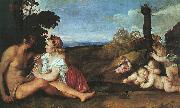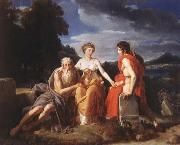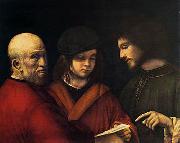Wholesale Oil Painting No Minimum |
|||||||||||
|
|
|||||||||||

|
|||||||||||
|
|
|
||||||||
|
|
||||||||
The Three Ages of Man
The Three Ages of Man Painting ID:: 1678 |
1511-12
National Gallery of Scotland, Edinburgh 1511-12 National Gallery of Scotland, Edinburgh |
|||||||
|
|
||||||||
Francesco SimoniniItalian Painter, b. 1686, Parma, d. ca. 1753, Venezia, or Firenze |
||||||||
|
|
||||||||
|
|
The Three ages of Man
The Three ages of Man Painting ID:: 51776 |
mk221
1806
Oil on cavnas
110.5x144.8cm
mk221 1806 Oil on cavnas 110.5x144.8cm |
||||||
|
|
||||||||
GiorgioneItalian 1476-1510 Giorgione Galleries For his home town of Castelfranco, Giorgione painted the Castelfranco Madonna, an altarpiece in sacra conversazione form ?? Madonna enthroned, with saints on either side forming an equilateral triangle. This gave the landscape background an importance which marks an innovation in Venetian art, and was quickly followed by his master Giovanni Bellini and others.Giorgione began to use the very refined chiaroscuro called sfumato ?? the delicate use of shades of color to depict light and perspective ?? around the same time as Leonardo. Whether Vasari is correct in saying he learnt it from Leonardo's works is unclear ?? he is always keen to ascribe all advances to Florentine sources. Leonardo's delicate color modulations result from the tiny disconnected spots of paint that he probably derived from manuscript illumination techniques and first brought into oil painting. These gave Giorgione's works the magical glow of light for which they are celebrated. Most entirely central and typical of all Giorgione's extant works is the Sleeping Venus now in Dresden, first recognized by Morelli, and now universally accepted, as being the same as the picture seen by Michiel and later by Ridolfi (his 17th century biographer) in the Casa Marcello at Venice. An exquisitely pure and severe rhythm of line and contour chastens the sensuous richness of the presentment: the sweep of white drapery on which the goddess lies, and of glowing landscape that fills the space behind her, most harmoniously frame her divinity. The use of an external landscape to frame a nude is innovative; but in addition, to add to her mystery, she is shrouded in sleep, spirited away from accessibility to her conscious expression. It is recorded by Michiel that Giorgione left this piece unfinished and that the landscape, with a Cupid which subsequent restoration has removed, were completed after his death by Titian. The picture is the prototype of Titian's own Venus of Urbino and of many more by other painters of the school; but none of them attained the fame of the first exemplar. The same concept of idealized beauty is evoked in a virginally pensive Judith from the Hermitage Museum, a large painting which exhibits Giorgione's special qualities of color richness and landscape romance, while demonstrating that life and death are each other's companions rather than foes. Apart from the altarpiece and the frescoes, all Giorgione's surviving works are small paintings designed for the wealthy Venetian collector to keep in his home; most are under two foot (60 cm) in either dimension. This market had been emerging over the last half of the fifteenth century in Italy, and was much better established in the Netherlands, but Giorgione was the first major Italian painter to concentrate his work on it to such an extent ?? indeed soon after his death the size of such paintings began to increase with the prosperity and palaces of the patrons. |
||||||||
|
|
||||||||
|
|
The Three Ages of Man
The Three Ages of Man Painting ID:: 94673 |
c. 1500-1501
Type oil on canvas
Dimensions 62 cm x 77.5 cm (24 in x 30.5 in)
cyf c. 1500-1501 Type oil on canvas Dimensions 62 cm x 77.5 cm (24 in x 30.5 in) cyf |
||||||
|
|
||||||||
|
Giorgione Italian 1476-1510 Giorgione Galleries For his home town of Castelfranco, Giorgione painted the Castelfranco Madonna, an altarpiece in sacra conversazione form ?? Madonna enthroned, with saints on either side forming an equilateral triangle. This gave the landscape background an importance which marks an innovation in Venetian art, and was quickly followed by his master Giovanni Bellini and others.Giorgione began to use the very refined chiaroscuro called sfumato ?? the delicate use of shades of color to depict light and perspective ?? around the same time as Leonardo. Whether Vasari is correct in saying he learnt it from Leonardo's works is unclear ?? he is always keen to ascribe all advances to Florentine sources. Leonardo's delicate color modulations result from the tiny disconnected spots of paint that he probably derived from manuscript illumination techniques and first brought into oil painting. These gave Giorgione's works the magical glow of light for which they are celebrated. Most entirely central and typical of all Giorgione's extant works is the Sleeping Venus now in Dresden, first recognized by Morelli, and now universally accepted, as being the same as the picture seen by Michiel and later by Ridolfi (his 17th century biographer) in the Casa Marcello at Venice. An exquisitely pure and severe rhythm of line and contour chastens the sensuous richness of the presentment: the sweep of white drapery on which the goddess lies, and of glowing landscape that fills the space behind her, most harmoniously frame her divinity. The use of an external landscape to frame a nude is innovative; but in addition, to add to her mystery, she is shrouded in sleep, spirited away from accessibility to her conscious expression. It is recorded by Michiel that Giorgione left this piece unfinished and that the landscape, with a Cupid which subsequent restoration has removed, were completed after his death by Titian. The picture is the prototype of Titian's own Venus of Urbino and of many more by other painters of the school; but none of them attained the fame of the first exemplar. The same concept of idealized beauty is evoked in a virginally pensive Judith from the Hermitage Museum, a large painting which exhibits Giorgione's special qualities of color richness and landscape romance, while demonstrating that life and death are each other's companions rather than foes. Apart from the altarpiece and the frescoes, all Giorgione's surviving works are small paintings designed for the wealthy Venetian collector to keep in his home; most are under two foot (60 cm) in either dimension. This market had been emerging over the last half of the fifteenth century in Italy, and was much better established in the Netherlands, but Giorgione was the first major Italian painter to concentrate his work on it to such an extent ?? indeed soon after his death the size of such paintings began to increase with the prosperity and palaces of the patrons. The Three Ages of Man c. 1500-1501 Type oil on canvas Dimensions 62 cm x 77.5 cm (24 in x 30.5 in) cyf |
||||||||
|
|
||||||||
|
Prev Next
|
||||||||
|
|
||||||||
|
Related Paintings to Giorgione :. |
||||||||
|
|
||||||||
|
CONTACT US |



